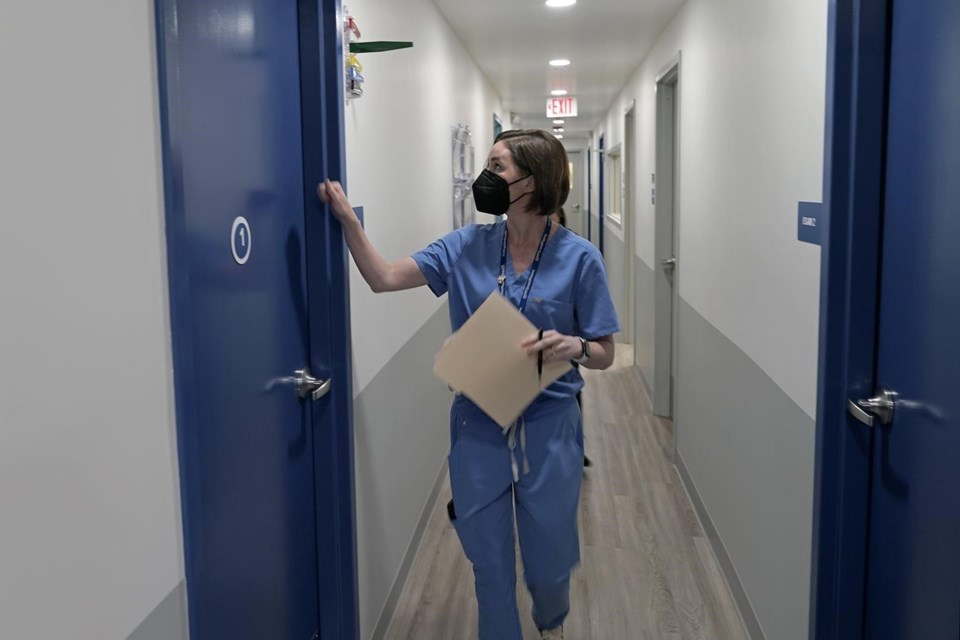TOPEKA, Kan. (AP) — A Planned Parenthood affiliate announced Tuesday that it has started teleconferences with off-site doctors for patients seeking medication abortions at one of its Kansas clinics, a small step toward potentially much broader access in a state that has become a destination for the procedure after an August vote affirming abortion rights.
Planned Parenthood Great Plains said it began offering telemedicine consultations Monday to patients visiting its Wichita clinic. President and CEO Emily Wales said the immediate goal is to have more days that patients can go there to get medication abortions. She said her affiliate hopes to offer the service to patients visiting its other two clinics on the Kansas side of the Kansas City area “in short order” and eventually to allow patients in doctors' offices and clinics across the state to teleconference with its physicians.
The move comes as Kansas abortion providers say they are seeing a flood of requests for appointments from women in states with more strenuous restrictions on abortion than Kansas — particularly Oklahoma and Texas. Kansas voters in August decisively voted to retain state constitutional protections for abortion rights.
The announcement also came less than a month after a state-court judge blocked enforcement of Kansas' ban on telemedicine abortions. The abortionfinder.org website lists 26 other states in which residents seeking abortion medications can teleconference with doctors, including Colorado, Illinois, Iowa, Michigan and Wyoming. However, for some states, the website lists only online pill providers, such as Aid Access or carafem.
“My vision for telehealth medication abortion is the same as my vision for abortion generally, which is that it would be widely accessible by many providers,” Wales said in an interview ahead of the announcement.
The blocked Kansas law required a doctor to be in the same room with a patient taking what is typically the first of two doses of medication to end a pregnancy. Another provider, a Wichita clinic operated by the abortion rights group Trust Women, offered telemedicine abortions for a few months late in 2018 but stopped because the legal climate was uncertain at the time.
Trust Women also expects to offer telemedicine abortions but has said it is considering what additional staff and infrastructure it will need.
Eighteen states have bans on telemedicine abortions in place, according to national groups on both sides of the debate. They include Arizona, Indiana, Nebraska and North Carolina.
Kansans for Life, the state's most politically influential anti-abortion group, responded to what it called Planned Parenthood's “dark announcement” by promising to consider “every possible course of action,” including legislation.
Abortion opponents have long argued that telemedicine bans protect women's health by ensuring a physician is present to deal with major problems, though research has shown that abortion pills are safe.
The long-term goal, Wales said, is to work with a network of doctors or clinics across the state so that women don’t have to travel to Wichita or the Kansas City area to obtain abortion medications.
Patients in states with more restrictive abortion laws still would have to travel to Kansas, as they do now. Doctors doing the teleconsulting also would have to be licensed to practice medicine in Kansas, as they must be now.
For now, Planned Parenthood Great Plains is using existing staff and physicians to offer telemedicine abortion consultations to patients in Wichita. Wales said while the clinic sometimes has a doctor there three or four days a week, one day a week is typical. Her affiliate's medical director, Dr. Iman Alsaden, said there would have been no abortion appointments Monday in Wichita without teleconferencing.
The Planned Parenthood affiliate already offers some telehealth services, such as refilling birth control prescriptions or gender-affirming care visits for transgender patients. Wales said it's still deciding day-by-day how quickly to expand telemedicine abortion appointments.
Abortion providers had to wait until this year for a clearer picture of the legality of telemedicine abortions. The statewide vote in August preserved a Kansas Supreme Court ruling in April 2019 that access to abortion is a “fundamental” right under the state constitution.
The vote came as Trust Women was pursuing a lawsuit to against the state's ban on telemedicine abortions. That lawsuit led to the state-court judge's order blocking enforcement of the Kansas telemedicine abortion ban.
“We’re pretty confident that the courts are on our side and that we have a very strong legal leg to stand on,” said Erin Thompson, Planned Parenthood Great Plains’ general counsel.
___
Follow John Hanna on Twitter: https://twitter.com/apjdhanna
John Hanna, The Associated Press



